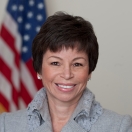
The painful reality is that whether it’s our mothers, sisters, aunts, daughters or friends, breast cancer will touch the vast majority of our lives in some way, and it is up to each of us to make sure that we, and our loved ones, remain vigilant about scheduling regular breast exams. Early detection can help save lives, which is why President Obama ensured that the Affordable Care Act provides preventive care for women without a co-pays, and why the White House is making a point again this Breast Cancer Awareness Month to elevate this issue.
Today, Dr. Jill Biden hosted a conference call with women from around the country on how the Affordable Care Act is helping to combat breast cancer. And tonight, in keeping with an annual tradition to honor Breast Cancer Awareness Month, the North Portico of the White House, as well as the Vice President’s residence at the Naval Observatory, are lit pink to honor those battling the disease, those we’ve lost, their families, and the survivors who are often the first to remind us that survival is not only possible, but highly probable for most women when the disease is detected early and addressed with proper care. Every woman is different, so it’s important to speak with your health care provider about the breast cancer screening schedule and tools that are most appropriate.
It can, of course, be difficult to face a frightening diagnosis, but regular discussions with our health care providers and an appropriate screening schedule can improve our chances for healthy outcomes. And that goes for all women, because while a family history of the disease can increase your chances of developing breast cancer, the majority of breast cancers occur in women without a family history.
Research also shows that racial minorities and women from low-income communities are less likely to receive regular screenings, and thus less likely to catch the disease early. That’s a problem which is partly being addressed as millions of uninsured Americans secure health insurance through the Affordable Care Act, but raising awareness of the importance of regular mammograms is also key to addressing these types of disparities.
Breast cancer remains the second leading cause of cancer-related death among women. This year alone more than 230,000 women will be diagnosed. It is our responsibility as sisters, brothers, mothers, fathers, grandparents, and friends to make sure our loved ones are getting checked, and it is our shared responsibility to ensure that all Americans, no matter their race, sexual orientation, or financial status, have access to the insurance and health care they need.
Please take a moment this Breast Cancer Awareness Month to spread the word to those you care about, and urge anyone looking for more information to visit the CDC’s website: http://www.cdc.gov/cancer/breast/.
If you, or anyone you know is living without health insurance, please visit HealthCare.gov. Open Enrollment starts on November 15, which is just one month away, so get educated on your options and prepare to #GetCovered.
More information is also available at WomensHealth.gov.
Valerie Jarrett is a Senior Advisor to President Barack Obama.



